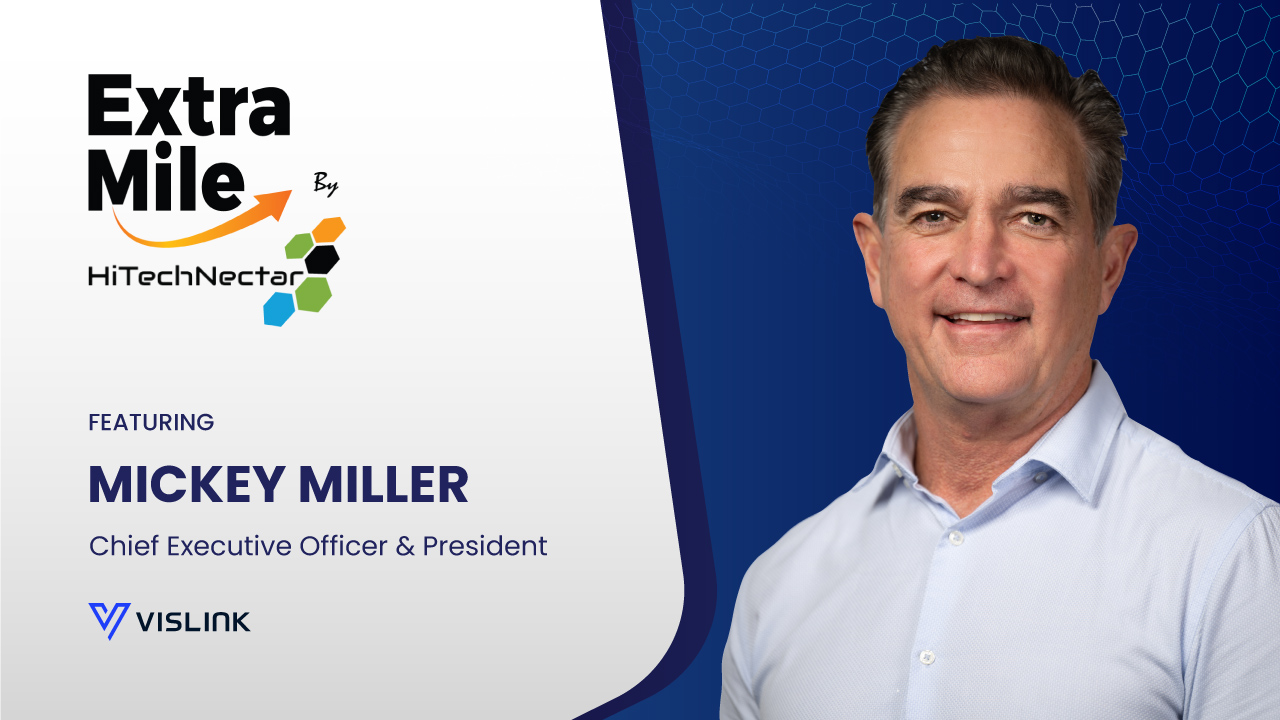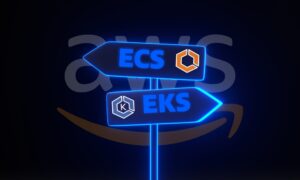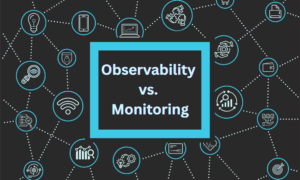Host: Hello, and welcome to another episode of ExtraMile by HiTechNectar, an interview series that bridges the gap between industry leaders and enthusiasts. I am your host, Sayali, and we’re here to discuss the latest innovations, tech trends, marketing practices, expert insights, and a lot more.
For today’s session, we’re thrilled to have Mr. Mickey Miller with us, CEO and President of Vislink, a company transforming live video and data communication. Vislink is all about pushing the boundaries of how the world connects by delivering cutting-edge solutions across industries like sports, news, and even the military.
Mickey has been with Vislink for over 5 years, playing a key role in its growth. With his deep expertise in technology and communication, he’s a well-respected leader in the industry.
So, let’s all dive into his insights, explore the future of modern communication. Welcome, Mickey; it’s a pleasure to have you with us today.
Miller: It’s great to be here. Thank you.
Host: So, Mickey, you’ve been in the technology and communication industries for over 25 years. What do you think have been the most significant advancements in these fields?
Miller: Wow, it’s making me feel old, but yeah, it’s been quite a journey in data and communications and technology in general. I think it all, you know, IP in the late 90s and early 2000s was really the basis that we’ve been able to build upon. So, whether it’s mobility, 3G, 4G, 3G, 5G, or AI on top of that with cloud, I think, you know, those are all key elements of what have helped the entire world grow and become more productive.
So, you know, over that 25 years, tech really didn’t play a big role in industry, say in the 80s and 90s, but now it’s the mainstay key industry for global growth. So, it’s been real exciting to be a part of and see how it’s progressed over the years. But I think we’re still in the early stages.
I think there’s a tremendous amount of opportunity for tech to change our lives in much bigger ways. And we’re seeing it on a daily basis through what’s happening with AI.
Host: So, moving forward, entering the data communication sector takes both technical expertise and a vision for the future. So, what inspired you to pursue this field?
Miller: A job offer initially. You know, at the time, tech was early, in the very early stages. And the opportunity that presented looked like a tremendous growth opportunity.
And many companies, traditional companies, were trying to understand how they can grow in this new emerging tech. But it wasn’t clear. I mean, this was pre-Amazon, pre-a lot of the companies that we know that approve Google.
But clearly, IPs and data communications was clear that it had the opportunity to transform. Much like we see with what AI can do to transform. So, when you look at the big pillars of kind of salient points, even from IP, and then, of course, the internet, data networks, and from data networks to mobile networks, mobile networks to cloud, and now AI on top of that, and the combination of all those creates incredible productivity opportunities for our world and incredible opportunities for the tech sector in general.
Host: So, speaking about data and video communication, so they provide real-time intelligence and enable secure communication. So, how are these technologies beneficial for defense and military operations?
Miller: It’s super critical to provide real-time situational awareness and intelligence gathering, to have very low latency, very high-fidelity communication, both video, audio, and data for control. It’s very, very important to all participants in the theatre of operations. So, we see what we do here at Vislink to be a key element to bring the type of immersive and intimate type of video that you need, that AI can use to make decisions in the future, that operators can use to make decisions in the future and do a much better job.
That could be in advanced surveillance reconnaissance, encrypted communications, analytics, AI power analytics. So, it really creates a basis to do anything to help improve how we position ourselves in the world.
Host: So, speaking of innovation, how are augmented reality and, virtual reality, and other immersive technologies changing the way we communicate and consume media?
Miller: I think it’s tremendous. I don’t know if you saw what we did with ATRL and Aspire in Dubai, in Abu Dhabi. Tremendous opportunity to show how this is an auto racing event that’s been going global throughout the world.
We were able to create a high-fidelity link for AR and VR, whereby you can see what it’s like to be in an engine going 250 miles an hour. And so, creating incredible capability, and we see AR and VR that transcending into things, as we talked about, better surveillance, equipping the warfighter with capabilities we don’t have today. And so, we see that as a key element as well, and the tools that can help grow opportunity in our world.
Host: So, shifting our gaze to entrepreneurship, the rise of tech startups has changed modern entrepreneurship, making innovation more accessible. So, what factors have played a major role in this shift? And where do you see it heading?
Miller: I think a lot of factors. Number one, access to capital. The asset category for venture has increased dramatically and it’s global.
So, it’s just not Sand Hill Road and Silicon Valley, it’s global. I think cloud has been huge, you can create companies completely on the cloud. I think the talent that has grown, the global talent base, as opposed to isolated to certain countries and certain areas.
I think those three combinations have been tremendous for spawning the many small companies that exist today and are growing very aggressively. My son is in tech; he leads a fintech startup in South America called Velo. They’re all former Facebook and Uber employees that have done incredible job generating business very rapidly with scale and a low-cost base because of cloud.
Host: So, with rapid tech adoption, the commercial sector is more competitive than ever. Why is a customer-centric approach so essential in today’s market?
Miller: That’s critical. You have to solve a problem, ideally a big problem. If you’re not solving a problem and adding value to your customer, you really don’t have a solid business model.
So that’s why we focus heavily on our customers, understanding what their challenges are, what their workflows are, where we can help them in the workforce to either be more efficient or be drive more revenue and sales for themselves. So, it’s critical that you’re close to your customer, understand what their needs are because without that, you’re not adding value for your customer, you’re out of business.
Host: So, moving on, building a successful business comes with its own challenges. So, what are some key obstacles entrepreneurs usually face, and how can they overcome them?
Miller: I think the biggest challenge is identifying what that problem is you want to solve and make sure you’re not using technology to find a problem. You need to find the problem and figure out how technology can solve that problem or some other way to solve that problem. I think that’s key.
Number one. Number two is building a strong team. You have to have a very strong team, multidisciplinary engineering capabilities to be able to solve in a true sense, a big problem.
And then you’ve got to have a leadership that allows you to drive with people, get access to the capital, be able to make those dreams a reality. I think those are the three key factors, but access to capital is much easier than it was 25 years ago. And there’s a lot of talented people with some great ideas.
So, it’s really focused on how you can convert those ideas into a scalable business that will outsize returns for investors.
Host: So, lastly, the wireless video communication sector is evolving at a great pace. So, what key trends do you see shaping the industry in the coming years?
Miller: I think AI-powered video analytics is going to be huge. We’re already seeing that today. As you mentioned, augmented reality, virtual reality, I think is going to be a big piece of it as well.
The continued growth of 5G and ultimately 6G networks, I think will be a key role in it. Ultra HD streaming and compression technologies will be a big part of it. And then the integration of AI into all the various workflows will be massive.
I think whereas the last 25 has been incredible, I think the next 10 years are going to blow that away. I think the opportunity for entrepreneurs and for tech is massive and gives us a chance to really transform industries, online industries, new industries, in a way that has never been seen before. We’re at a huge inflection point here of innovation and technology, a tremendous global opportunity for commercial and technical people throughout the world.
So, your generation has a great opportunity here to really make something because the opportunity in the next 10 years will dwarf what we had in the last 25.
Host: Alright, thank you for the answers. So, just to end this on a super fun and light note, if you could have one superpower, what would it be and why?
Miller: See the future.
Host: Okay.
Miller: And why? Obviously, it would take a lot of serendipity out of things, which wouldn’t be fun but certainly would make decision-making easier.
Host: Alright. Thank you, Mickey, for being such a sport. Thank you for sharing your expertise with us today.
Your insights have been incredibly valuable, and we truly appreciate your time. Thank you so much.
Miller: Thank you, Sayali. Take care.
Host: Thank you all for being part of this exclusive interview. I am your host, Sayali, signing off. See you soon in the next episode of ExtraMile by HiTechNectar, with our next extraordinary leader on board sharing their wisdom. Until then, please stay tuned.


























